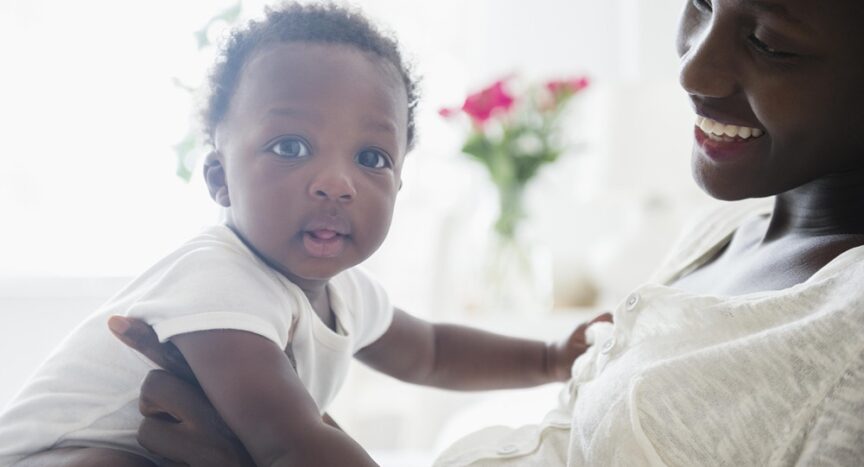If you’re a mother, you likely have the flu on your radar as we approach this winter virus season. Something just as important, but not as widely discussed, is a serious lung infection caused by respiratory syncytial virus, or RSV, and how it can impact babies. While hospitalization is uncommon, RSV is the leading cause of hospitalizations in babies under one.
If you’re feeling concerned, don’t worry–you’re not alone. Dr. Kerry-Anne Perkins, D.O., a board-certified OBGYN and member of the American College of Obstetricians and Gynecologists (ACOG), sat down with EBONY to chat about RSV and why now is the time to speak with your healthcare provider or OBGYN about immunizations available to help protect your babies.
“I’ve been there myself as a mother facing this for the first time last year, and as a practicing OBGYN, I know how important it is to counsel my patients on the ways to help protect your little ones from this very unpredictable infection,” Dr. Perkins shared.

Why RSV is Serious for Babies
RSV spreads when droplets from a cough, sneeze, infected surface or shared toy get inside the eyes, nose or mouth. “RSV is a highly contagious virus that affects the lungs and breathing passages,” Dr. Perkins explained. Most of the time RSV causes mild cold-like symptoms. It can also progress quickly and unpredictably – even babies born healthy and full-term can get a serious RSV infection.
“While it’s usually mild in older children and adults, it can be more serious for babies because the infant immune system isn’t fully developed to fight off infections. In babies, especially those under six months, RSV can lead to more serious lung conditions like pneumonia,” she shared.
Even with preventative measures, it’s important to be familiar with the symptoms of RSV. That includes difficulty breathing or rapid, shallow breaths, persistent coughing or wheezing, less interest in feeding, and fewer wet diapers, which can be a sign of dehydration. If you notice your baby experiencing any of these symptoms, you should reach out to your healthcare provider immediately.
Helping to Prevent Serious RSV Lung Infection
Dr. Perkins believes in a holistic approach to prevention: “Anyone who interacts with your child could give them RSV, even if they don’t feel really sick. Washing hands is one of the easiest ways to prevent the spread of germs, but avoiding crowded spaces, keeping toys and surfaces clean, and teaching older siblings to cover their mouth when coughing or sneezing can also help to limit RSV exposure.”
Up until last year, the only preventative option for RSV was for babies at high risk of developing serious RSV lung infections. However, a preventative option became available last year: a monoclonal antibody delivered to babies shortly after birth or at a regular checkup along with other immunizations.
Beyfortus® (nirsevimab-alip) 50mg and 100mg Injection: An Extra Layer of Protection Against RSV For Babies
Beyfortus is a prescription medicine used to help prevent a serious lung infection caused by RSV. It can be used in:
- newborns and babies under one-year of age born during or entering their first RSV season.
- certain children up to 24 months of age remain at risk of serious RSV lung infection through their second RSV season.
Beyfortus should not be given to children with a history of serious allergic reactions to nirsevimab-alip or any of the ingredients in Beyfortus. Beyfortus may not protect all children (see below for additional Important Safety Information). Dr. Perkins counsels her patients on RSV prevention options starting in the second trimester, which includes a maternal vaccine as well as Beyfortus.
“Based on decades of scientific research, Beyfortus is designed to help protect babies against RSV by limiting their chances of developing serious lung infections that can lead to hospitalization in some cases,” Dr. Perkins emphasized. “When my baby girl was born last November, I felt confident getting her Beyfortus at a pediatrician appointment knowing it would offer her protection against RSV through five months.”
Depending on when they’re born, your baby can receive Beyfortus shortly after birth, before leaving the hospital, or at a regular checkup during or just before the start of their first RSV season.
Beyfortus may be available to your baby at no cost as part of the Vaccines for Children or VFC program. VFC is a federally funded program that provides vaccines to children at no cost for those who might not be vaccinated because of an inability to pay. Some providers may charge an administration fee.
The Difference Between the Maternal Vaccine and the Monoclonal Antibody
Dr. Perkins likes to use a cooking analogy to help explain the difference between the maternal vaccine and the monoclonal antibody. “Just like you take ingredients and turn them into a home-cooked meal, when you get the vaccine during pregnancy, your body cooks up the antibodies, which are passed along to your baby before birth. The monoclonal antibody is like ordering takeout–your baby is given the ready-made antibodies they need to fight RSV right away without waiting for their body to produce its own. It offers fast-acting protection.”

Ask Your Doctor if Beyfortus is Right for Your Baby
RSV season has started and Beyfortus is available at providers offices across the country. “Don’t wait. Now is the time to talk to your OBGYN or pediatrician about RSV prevention, including Beyfortus, and what’s best for you and your baby. Remember, you’re not alone in this and there are steps you can take to help give your babies an extra layer of protection against serious RSV lung infection.” Visit Beyfortus.com to learn more.
IMPORTANT SAFETY INFORMATION
Your child should not take Beyfortus if your child has a history of serious allergic reactions to nirsevimab-alip or any of the ingredients in Beyfortus. Before your child receives Beyfortus, tell your healthcare provider about all of your child’s medical conditions, including if your child:
- has ever had a reaction to Beyfortus.
- has bleeding or bruising problems. If your child has a problem with bleeding or bruises easily, an injection could cause a problem.
Tell your healthcare provider about all the medicines your child takes, including prescription and over-the-counter medicines, vitamins, and herbal supplements. Your infant should not receive a medicine called palivizumab if they have already received Beyfortus in the same RSV season.
Serious allergic reactions have happened with Beyfortus. Get medical help right away if your child has any of the following signs or symptoms of a serious allergic reaction:
- swelling of the face, mouth, or tongue
- difficulty swallowing or breathing
- unresponsiveness
- bluish color of skin, lips, or under fingernails
- muscle weakness
- severe rash, hives, or itching
The most common side effects of Beyfortus include rash and pain, swelling, or hardness at the site of your child’s injection. These are not all the possible side effects of Beyfortus. Call your healthcare provider if you have questions about side effects.
INDICATION
Beyfortus is a prescription medicine used to help prevent a serious lung disease caused by Respiratory Syncytial Virus (RSV) in:
- newborns and babies under 1 year of age born during or entering their first RSV season.
- children up to 24 months of age who remain at risk of severe RSV disease through their second RSV season.
Beyfortus may not protect all children.
Please see full Prescribing Information, including Patient Information, for more details.




